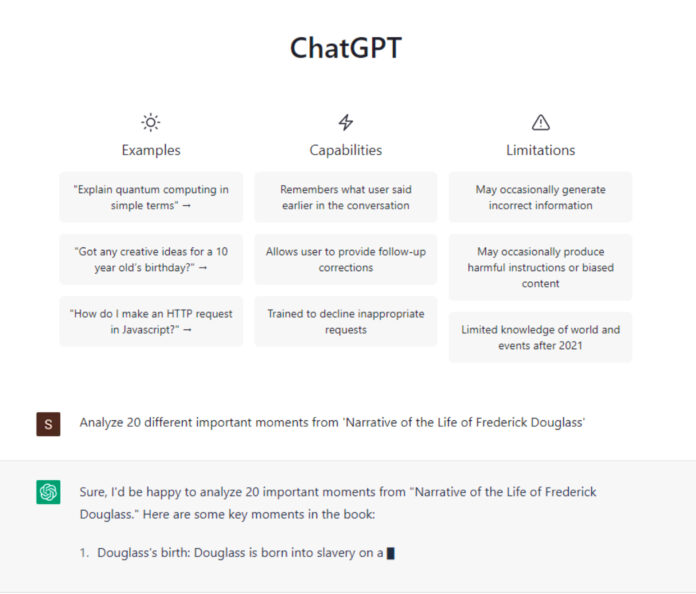
ChatGPT is a new artificial intelligence (AI) software that was released November 30, 2022 by OpenAI, a company co-founded by Elon Musk. It is currently free and open to the public on OpenAI’s website in order to collect feedback and data from users.
ChatGPT’s software enables it to use data from its programming in order to answer whatever questions users may have. This new technology has sparked controversy and concern, especially by those whose jobs could be affected and even taken as ChatGPT and similar artificial intelligence software continue to improve.
If used correctly and with the precise command necessary, ChatGPT can write essays with any theme a user dictates, complete homework assignments, explain confusing or foreign topics and much more.
At the center of the arguments against ChatGPT is its ability to assist students in cheating in a fraction of the time it would take them to complete the assignment on their own. This concern, along with many others, has brought skepticism from educators across the country who worry students will no longer get the learning opportunities they need to succeed.
English teacher William Schrader has discussed both the positives and negatives of ChatGPT with his Creative Writing class. While Schrader is open to the idea of using ChatGPT as a tool, he also has concerns.
“I’m worried that ChatGPT will negatively affect the learning of students,” he said. “Schools should make an effort to understand ChatGPT’s benefits and drawbacks.” He believes teachers “should assign more…handwritten assignments and instruct students on ways ChatGPT can be used as a tool.”
There are, of course, valid reasons for concerns about cheating. According to a survey conducted by Study.com, 89% of the 1,000 students interviewed have used ChatGPT for homework assignments, while 53% have used ChatGPT to write an essay.
“We had an essay assignment and my friend told me they used ChatGPT to write part of their essay,” an anonymous student said. “It wasn’t obvious; they had definitely written a lot of it themselves and edited it.”
Abigail Staley, a junior in Schrader’s AP Language & Composition class, admits that while she would use ChatGPT, it wouldn’t be for what most teachers fear.
“I probably wouldn’t use ChatGPT as a source for assignments … but I could see myself asking it for general descriptions of things I don’t understand,” she said, adding that schools should “use ChatGPT to their advantage” and implement AI into curricula.
With technology constantly evolving, it’s hard for teachers to keep up, English teacher Matthew Spencer said, but he is “more on the side of cautious excitement,” even though the technology is in its infancy.
With so many factors to worry about, it’s understandably difficult for educators to embrace the new technology. Students, on the other hand, are excited to see just what ChatGPT can do.
“I think it’s a helpful tool,” sophomore D’Arlene Martinez said. “There are plenty of tools that students already use … so I don’t think this will change anything.”
Martinez pointed out that sites such as Grammarly, SparkNotes and NoodleTools are all used regularly for a number of tasks by students. The new and controversial aspect of ChatGPT is that OpenAI’s software can combine all of those websites and more with virtually no effort required by students. Moreover, none of the previously mentioned websites or applications has been blocked by the district except for ChatGPT.
It’s hard to imagine that students at Chapel Hill High School won’t use OpenAI’s new software. The question isn’t “What should schools do about ChatGPT?”; it’s “What should schools do about the curriculum now that ChatGPT is here?”











